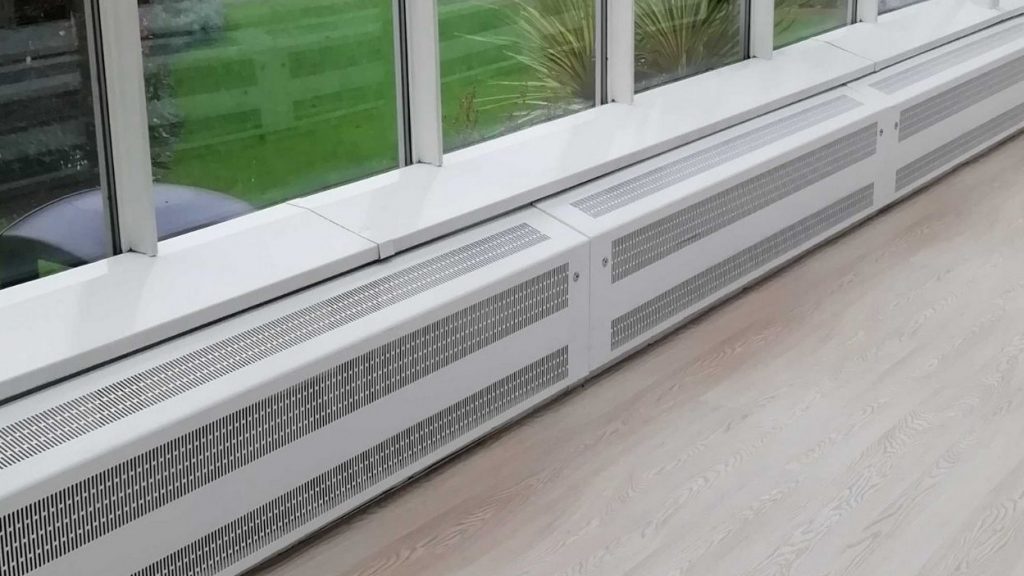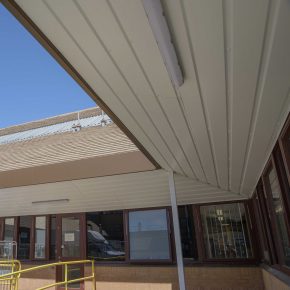
Installing a DeepClean hospital radiator cover within a live ward – Contour
Installing radiators in a live environment poses unique challenges for the installer, which are amplified in care-cantered environments, such as hospitals, as Contour explain here…
As you can imagine, live wards within hospitals are busy, with a limited amount of space for patients and beds. A hospital is often at maximum capacity, with a lot of people requiring medical attention.
For LST radiator installers, this may pose significant challenges; when a patient’s health is at stake, a solution that enables quick installation without compromising on quality is essential.
DeepClean
Cleaning and hygiene are. without a doubt, important within hospital radiators, to reduce the risk of hospital-acquired infections and make the overall environment safe and comfortable for all service users.
Some patients may spend a considerable amount of time in hospital, so these individuals should feel at ease.
Contour take it one step further and offer LST radiator covers that can promote and optimise hygiene with its DeepClean LST radiator.
The DeepClean low surface temperature radiator guards include BioCote®, a patented silver-based anti-microbial agent in the Radiator guards’ paint.
BioCote® is integrated at the production stage, to offer optimum protection against various microbes: bacteria, mould, and some viruses.
This makes the DeepClean radiator the ultimate companion for hospital environments.

LST Radiator Installers Must Show Sensitivity says Contour
The installers must show sensitivity when installing an LST radiator on a live hospital ward. It is uncomfortable for installers to ask patients and visitors to relocate in order for installers to get on with fitting the radiators, as installers do not want to cause any inconvenience.
The patients and visitors have other worries and concerned parents of children have their children’s wellbeing as a top priority. So, kindly asking these individuals to relocate can be difficult for installers.
Therefore, sensitivity and respect must be shown, as it is unknown just what people are going through in a hospital.
Space is Limited
A shortage of beds in hospitals can be common; space becomes limited and relocating patients and visitors can become challenging.
So, working with limited space is something installers expect, to ensure they are making as little disruption as possible.
Prefabricated Cut-Outs
To speed up the time of installation and to create minimal fuss, Contour’s installers often have the benefit of installing covers that have prefabricated cut-outs in them.
This ensures there is a speedy installation and limited mess is made, meaning service users in hospitals can get on with their day, with no disturbance. Prefabricated cut-outs also reduce the noise installation can make.
Conclusion from Contour
There are challenges installers may encounter within hospitals because they do not want to cause any interference or hassle to service users. Contour’s installers show sensitivity and can work well in limited spaces.
With prefabricated cut-outs, the installation process is quicker, less messy, and quieter. With this, installers can make sure they do not cause any trouble at the hospital.
Contour can be contacted at;
The Mansions
43 Broadway
Shifnal
TF11 8BB
Tel: 01952 290 498
Email: [email protected]
Visit Supplier's page
Latest news

26th April 2024
Alumasc Skyline and Rainwater package specified at Weston-super-Mare Hospital
A package of products from Alumasc Water Management Solutions (AWMS) has been used for the external refurbishment of the roofline at Weston General Hospital in Weston-Super-Mare.
Posted in Aluminium Products, Articles, Building Industry News, Building Products & Structures, Building Services, Building Systems, Case Studies, Cladding, Drainage Services, Drainage, Guttering, Soffits & Fascias, Fascias, Restoration & Refurbishment, Retrofit & Renovation, Roofs, Walls
26th April 2024
Hush Acoustics optimises fleet operations by securing FORS Gold accreditation
Hush Acoustics has invested in the safety and sustainability of its commercial vehicle fleet by achieving Gold status in the Fleet Operator Recognition Scheme (FORS).
Posted in Acoustics, Noise & Vibration Control, Articles, Building Industry News, Building Products & Structures, Building Regulations & Accreditations, Building Services, Ceilings, Facility Management & Building Services, Floors, Health & Safety, Insulation, Restoration & Refurbishment, Retrofit & Renovation, Site Preparation, Sustainability & Energy Efficiency, Walls, Waste Management & Recycling
26th April 2024
Safeguard Europe: Penetrating damp - how to diagnose the damage
As Safeguard gets ready to deliver another informative session of one of its most popular webinars, the company outlines some of the most common reasons for rain penetration through brickwork.
Posted in Articles, Bricks & Blocks, Building Industry Events, Building Industry News, Building Products & Structures, Building Services, Continuing Professional Development (CPD's), Damp & Waterproofing, Facility Management & Building Services, Information Technology, Posts, Render, Restoration & Refurbishment, Retrofit & Renovation, Seminars, Training, Walls
25th April 2024
ADSA: Competence Initiative Makes Progress
The Joint Competency Initiative (JCI), in which the Automatic Door Suppliers Association (ADSA) is involved, is finalising its first framework for installers within the door, gates and shutter industry.
Posted in Access Control & Door Entry Systems, Architectural Ironmongery, Articles, Building Associations & Institutes, Building Industry Events, Building Industry News, Building Products & Structures, Building Regulations & Accreditations, Building Services, Continuing Professional Development (CPD's), Doors, Facility Management & Building Services, Health & Safety, Innovations & New Products, Publications, Research & Materials Testing, Restoration & Refurbishment, Retrofit & Renovation, Security and Fire Protection, Site Preparation
 Sign up:
Sign up: